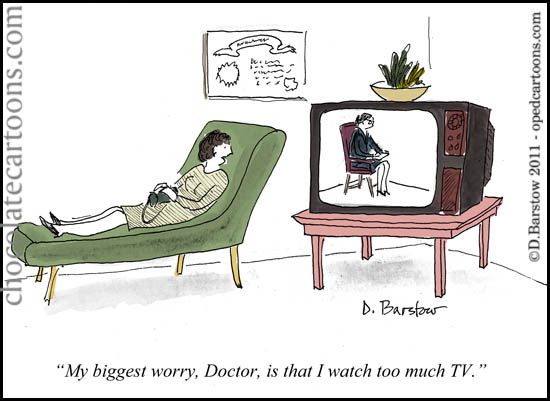
At a library event up in Sealy ten or so years ago I had a pleasant conversation with a lady about books. That, not surprisingly, often happens in libraries.
We agreed that we’d both enjoyed David McCullough’s “John Adams”, the biography of the second president. I asked if she’d seen the HBO miniseries and this lady, probably in her mid-seventies, told me she didn’t own a television set, and never had.
I must have looked sufficiently shocked for her to laugh and assure me I’d heard her correctly.
Now before you assume that I’m going to launch into a diatribe here about the evils of television let me tell you that there are four of them in my house. So anything negative I’d have to say about this topic would be downright hypocritical and I’d be sailing under a false flag. But meeting that lady in Sealy made me think about how TV sets and the people who watch them have changed in my lifetime. And my lifetime is almost exactly how long television has been a constant fixture in American homes.
As TV screens get bigger and bigger, sometimes taking up entire walls, it becomes more difficult to remember when they were built into pretty pieces of polished wood furniture with doors that could be closed to hide the screen. That way, the living room or den could look, most of the time, more like what they were intended to be: places where family and friends could sit and actually talk to each other. Or where you might settle into a comfortable chair and read the newspaper, a magazine, or a book. What a concept.
Nowadays hiding our television sets is to many people as ludicrous an idea as, unfortunately, reading books and talking to each other – in person, not on cell phones.
Back in the 50s and early 60s, most people had televisions. But it wasn’t uncommon for there to be only per household. And that one was usually in a corner of the living room, so as not to be conspicuous when company came over.
Nobody would have dreamed of having the set turned on while guests were there, unless they’d come specifically to watch a program with friends. But even then when the show was over the host or hostess got up and turned off the set – no remotes then, remember – and coffee and cake or drinks and hor d’oeuvres were served. The conversation might have touched on what had been watched – maybe how good the June Taylor Dancers were on Jackie Gleeson that night or how funny Senor Wences was on Ed Sullivan – but at no point would anyone say “Let’s see what else is on.”
Part of the reason, of course, was that there wasn’t much else on. There were only three networks, all of which played the national anthem at midnight and went off the air, leaving insomniacs and night owls with nothing to watch but a test pattern till dawn. But the main reason the TV was turned off was that it hadn’t yet become Ground Zero in the home.
My mother was home all day during what came to be called the Golden Age of television, and the only time our big Zenith was turned on during daytime programing was occasionally for Julia Child’s French cooking show or Art Linkletter’s “House Party”, both of which were aimed at housewives. And I think she liked “Password”, a game show. But the rest of the day she spent cleaning house, cooking, or reading. None of which she felt had to be done with the TV blaring away.
At some point in modern society the epicenter of the home moved from the hearth or the family dinner table to big radios that everyone would gather around. Then those devices grew windows, so everyone could not only hear what was going on but actually see it. Eventually the windows got bigger and bigger and televisions staged a coup d’état, taking over most rooms in most houses and staying turned on most of the time. Not too many generations ago a person walking through a neighborhood at night would have seen the soft glow of firelight or reading lamps in windows; now it would likely be the flickering lights of television sets, and probably in several windows.
So, did the lady in Sealy have the right idea? Not for me. I enjoy quality television, and I wouldn’t want to do without football and baseball games and the news. But I also enjoy turning the set off and finding other things to do.
Remember Cicero’s advice: “Never go to excess, but let moderation be your guide”.
I’m pretty sure I heard that on television.
We have two televisions in our home. One prominently mounted in our living room because we don’t have a separate family room or game room. We also have one outside for those rare Houston,fall days that allow us to dine and watch sports at the outdoor bar. A good breeze is a must to make it a happy occasion. The joke in our house is that I don’t know how to work the television remote. It is a joke that is almost true. To my credit, I do read over a hundred books a year, and that is my escape. I don’t consider it to be any different than escaping into the television.
When I do find something on Amazon Video, I binge watch as a guilty pleasure.
LikeLike